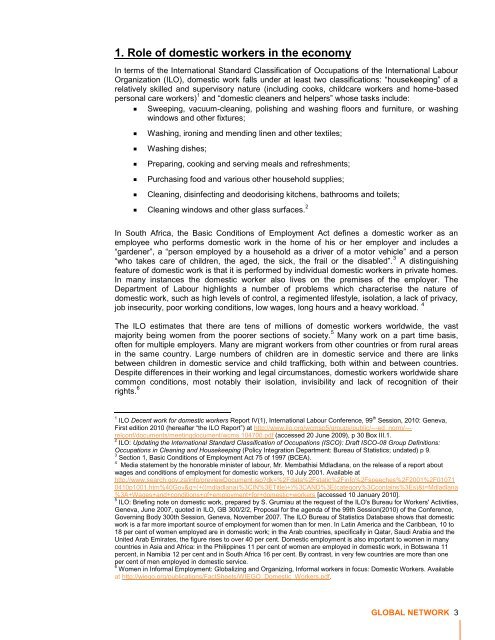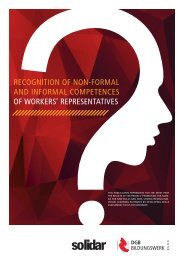domestic workers: decent work for all â south africa - Solidar
domestic workers: decent work for all â south africa - Solidar
domestic workers: decent work for all â south africa - Solidar
You also want an ePaper? Increase the reach of your titles
YUMPU automatically turns print PDFs into web optimized ePapers that Google loves.
1. Role of <strong>domestic</strong> <strong><strong>work</strong>ers</strong> in the economy<br />
In terms of the International Standard Classification of Occupations of the International Labour<br />
Organization (ILO), <strong>domestic</strong> <strong>work</strong> f<strong>all</strong>s under at least two classifications: ―housekeeping‖ of a<br />
relatively skilled and supervisory nature (including cooks, childcare <strong><strong>work</strong>ers</strong> and home-based<br />
personal care <strong><strong>work</strong>ers</strong>) 1 and ―<strong>domestic</strong> cleaners and helpers‖ whose tasks include:<br />
• Sweeping, vacuum-cleaning, polishing and washing floors and furniture, or washing<br />
windows and other fixtures;<br />
• Washing, ironing and mending linen and other textiles;<br />
• Washing dishes;<br />
• Preparing, cooking and serving meals and refreshments;<br />
• Purchasing food and various other household supplies;<br />
• Cleaning, disinfecting and deodorising kitchens, bathrooms and toilets;<br />
• Cleaning windows and other glass surfaces. 2<br />
In South Africa, the Basic Conditions of Employment Act defines a <strong>domestic</strong> <strong>work</strong>er as an<br />
employee who per<strong>for</strong>ms <strong>domestic</strong> <strong>work</strong> in the home of his or her employer and includes a<br />
―gardener‖, a ―person employed by a household as a driver of a motor vehicle‖ and a person<br />
―who takes care of children, the aged, the sick, the frail or the disabled‖. 3 A distinguishing<br />
feature of <strong>domestic</strong> <strong>work</strong> is that it is per<strong>for</strong>med by individual <strong>domestic</strong> <strong><strong>work</strong>ers</strong> in private homes.<br />
In many instances the <strong>domestic</strong> <strong>work</strong>er also lives on the premises of the employer. The<br />
Department of Labour highlights a number of problems which characterise the nature of<br />
<strong>domestic</strong> <strong>work</strong>, such as high levels of control, a regimented lifestyle, isolation, a lack of privacy,<br />
job insecurity, poor <strong>work</strong>ing conditions, low wages, long hours and a heavy <strong>work</strong>load. 4<br />
The ILO estimates that there are tens of millions of <strong>domestic</strong> <strong><strong>work</strong>ers</strong> worldwide, the vast<br />
majority being women from the poorer sections of society. 5 Many <strong>work</strong> on a part time basis,<br />
often <strong>for</strong> multiple employers. Many are migrant <strong><strong>work</strong>ers</strong> from other countries or from rural areas<br />
in the same country. Large numbers of children are in <strong>domestic</strong> service and there are links<br />
between children in <strong>domestic</strong> service and child trafficking, both within and between countries.<br />
Despite differences in their <strong>work</strong>ing and legal circumstances, <strong>domestic</strong> <strong><strong>work</strong>ers</strong> worldwide share<br />
common conditions, most notably their isolation, invisibility and lack of recognition of their<br />
rights. 6<br />
1 ILO Decent <strong>work</strong> <strong>for</strong> <strong>domestic</strong> <strong><strong>work</strong>ers</strong> Report IV(1), International Labour Conference, 99 th Session, 2010: Geneva,<br />
First edition 2010 (hereafter ―the ILO Report‖) at http://www.ilo.org/wcmsp5/groups/public/---ed_norm/---<br />
relconf/documents/meetingdocument/wcms 104700.pdf (accessed 20 June 2009), p 30 Box III.1.<br />
2 ILO: Updating the International Standard Classification of Occupations (ISCO): Draft ISCO-08 Group Definitions:<br />
Occupations in Cleaning and Housekeeping (Policy Integration Department: Bureau of Statistics; undated) p 9.<br />
3 Section 1, Basic Conditions of Employment Act 75 of 1997 (BCEA).<br />
4 Media statement by the honorable minister of labour, Mr. Membathisi Mdladlana, on the release of a report about<br />
wages and conditions of employment <strong>for</strong> <strong>domestic</strong> <strong><strong>work</strong>ers</strong>, 10 July 2001. Available at<br />
http://www.search.gov.za/info/previewDocument.jsp?dk=%2Fdata%2Fstatic%2Finfo%2Fspeeches%2F2001%2F01071<br />
0410p1001.htm%40Gov&q=(+((mdladlana)%3CIN%3ETitle)+)%3CAND%3E(category%3Ccontains%3Es)&t=Mdladlana<br />
%3A+Wages+and+conditions+of+employment+<strong>for</strong>+<strong>domestic</strong>+<strong><strong>work</strong>ers</strong> [accessed 10 January 2010].<br />
5 ILO: Briefing note on <strong>domestic</strong> <strong>work</strong>, prepared by S. Grumiau at the request of the ILO's Bureau <strong>for</strong> Workers' Activities,<br />
Geneva, June 2007, quoted in ILO, GB 300/2/2, Proposal <strong>for</strong> the agenda of the 99th Session(2010) of the Conference,<br />
Governing Body 300th Session, Geneva, November 2007. The ILO Bureau of Statistics Database shows that <strong>domestic</strong><br />
<strong>work</strong> is a far more important source of employment <strong>for</strong> women than <strong>for</strong> men. In Latin America and the Caribbean, 10 to<br />
18 per cent of women employed are in <strong>domestic</strong> <strong>work</strong>; in the Arab countries, specific<strong>all</strong>y in Qatar, Saudi Arabia and the<br />
United Arab Emirates, the figure rises to over 40 per cent. Domestic employment is also important to women in many<br />
countries in Asia and Africa: in the Philippines 11 per cent of women are employed in <strong>domestic</strong> <strong>work</strong>, in Botswana 11<br />
percent, in Namibia 12 per cent and in South Africa 16 per cent. By contrast, in very few countries are more than one<br />
per cent of men employed in <strong>domestic</strong> service.<br />
6 Women in In<strong>for</strong>mal Employment: Globalizing and Organizing, In<strong>for</strong>mal <strong><strong>work</strong>ers</strong> in focus: Domestic Workers. Available<br />
at http://wiego.org/publications/FactSheets/WIEGO_Domestic_Workers.pdf.<br />
GLOBAL NETWORK 3
















